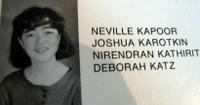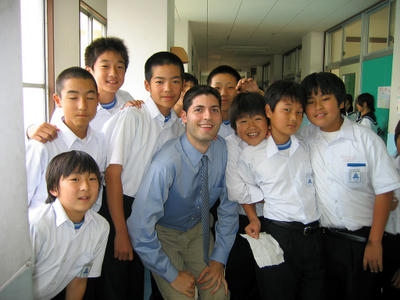 The offer sounded absurd. Could I make it to New York – all expenses paid – for the weekend? A family friend wished to present me as the ultimate surprise gift at my father’s 60th birthday bash. The chance to be the “icing on the cake” outweighed the long haul. Already starved for sleep from a week with no more than four hours rest on any night, I pulled an all-nighter before departure to wrap up last-minute preparations.
The offer sounded absurd. Could I make it to New York – all expenses paid – for the weekend? A family friend wished to present me as the ultimate surprise gift at my father’s 60th birthday bash. The chance to be the “icing on the cake” outweighed the long haul. Already starved for sleep from a week with no more than four hours rest on any night, I pulled an all-nighter before departure to wrap up last-minute preparations.
That morning I straggled into work an unprecedented 17 minutes late, barely in time for the last bell for the first of three scheduled classes. “How did you spend your weekend” was the lesson plan. I couldn’t help but gloat. The students “played basketball” or “didn’t do anything.” One virile chap “played sex everyday.” I was headed home for a cameo. The teacher translated, but the students still looked shocked.
I would like to thank Northworst for living up to its moniker. After a four-hour delay, a chilly reception awaited onboard. The cabin was super-cooled. My nose hairs stuck together when I inhaled. A stewardess overturned a beverage bin full of ice cubes, creating a watershed that trickled through the economy class aisle. I wondered if the water would freeze.
My time on the ground fared better. The customs officer noticed hesitation on my declaration form with a crossed out answer. “Where is your residence?” he asked. “Uhhh, I don’t really know,” I trailed off. He returned my smile with one of his own. Maybe he hadn’t seen it all. “Where do you receive letters?” “Both countries, but mostly USA.” “Okay, you’re a resident. Welcome back.” And happy to be back was how I felt opening a yellow cab’s window on the Triborough Bridge to soak up the night skyline that blurred by with familiarity. To maintain the element of surprise, I couldn’t return home, and instead spent the night out on the town. With driver’s license and passport in luggage, I hoped my Japanese foreigner’s card would do the trick at the door. “Show me something in English!” laughed the bouncer, waving me inside. For effect I pointed out the birth date, and explained that I lived in Tokyo…but am a resident of New York.
To maintain the element of surprise, I couldn’t return home, and instead spent the night out on the town. With driver’s license and passport in luggage, I hoped my Japanese foreigner’s card would do the trick at the door. “Show me something in English!” laughed the bouncer, waving me inside. For effect I pointed out the birth date, and explained that I lived in Tokyo…but am a resident of New York.
At 3 a.m. I left the bar craving a subway ride. I boarded an uptown 6 train, and in Japanese style began to nod off, not worried if exhaustion tipped my head onto the shoulder of the black youth next to me. I awoke to his saying, “Dude, you don’t look so cool,” followed by a recorded, “This is 96th Street.” Sayonara! I bolted off the train before it chugged into El Barrio de East Harlem.
Saturday night I cinematically entered the birthday feast, held at a sumptuous Chinese restaurant in Midtown. The birthday fly-by mission was better orchestrated than the Iraqi invasion and Katrina’s response. My family and most of the 30 guests were stunned. “Jeff?” my sister questioned. Mom’s eyes widened to the point that they could have rolled out of their sockets. She couldn’t believe them, and ran over to touch my cheeks. “Are you real? Are you real?”
Only temporarily real. The brevity of my visit added punch to my presence. Fourteen hours later I jetted back to Tokyo with memories that will persist until dad turns 70.
Tuesday, September 20, 2005
New York In A New York Minute
Posted by
ジェフリー
at
10:10 AM
3
comments
![]()
Labels: international travel
Tuesday, September 13, 2005
On The Radio
 What began as an off-hand joke became reality Saturday, September 3. A month prior I suggested to Hicca, of Daruma fame, that I be a guest on Rainbowtown 79.2 FM where she produces.
What began as an off-hand joke became reality Saturday, September 3. A month prior I suggested to Hicca, of Daruma fame, that I be a guest on Rainbowtown 79.2 FM where she produces.
The first weekend of every month a token foreigner is invited into the studio to share viewpoints on Japan. From 10 to 11 a.m., a voice from America hit the local airwaves. Hicca, who translated and produced, planned to question me about teaching. Given the immediacy of an increasingly man-made catastrophe, I wished instead to give voice to Katrina.
The Japanese press hadn’t been covering enough about the flood with upcoming national elections, reminders of which I struggled to block out. Vans outfitted with bullhorns cruised streets broadcasting party platforms. Candidates and staff waved with white gloves from inside, or from atop the van’s roof deck if parked near a train station or supermarket.
Otosan, Daruma’s genial father, dropped by to deliver a needed energy boost: an ice-cream sandwich breakfast. Rainbowtown’s stationmaster (and Daruma regular) was happier to see me than I was him on four hours rest. He asked if I was American. “Sort of” was my first response, unsure of what being American meant anymore except shame and embarrassment over foreign and now domestic affairs.
He pointed to a picture in the paper of black people waiting for food. In Japanese he recounted driving a relief truck to Niigata after a 6.8 quake killed 40 people in 2004. Some survivors abandoned the refined civility for which the Japanese are famous, and grabbed his collar to demand supplies. Storm orphans in New Orleans were grabbing more than just collars.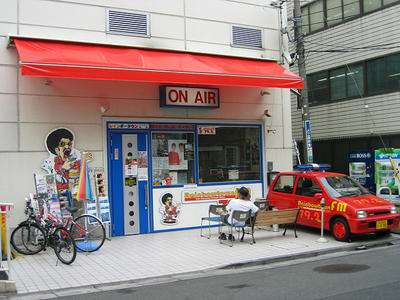
In between The Beatles and Aretha Franklin, I delivered a Reader’s Digest summary of Katrina. After all, Hicca had to translate, and many out there didn’t even know the basics of a hard to grasp reality of an all-American tragedy: a major metropolitan area was flooded, sweeping away thousands of lives. I logged onto CNN.com videos of floods, fires, and looting. Graphic scenes enlivened still words. “Ehhhhh, I had no idea,” Hicca kept repeating, off-air.
Before we transitioned  to teacher talk, Hicca played “Stand By Me.” I reflected on the irony of government's failure to do the same for citizens in the most dire of circumstances, with the most basic of needs.
to teacher talk, Hicca played “Stand By Me.” I reflected on the irony of government's failure to do the same for citizens in the most dire of circumstances, with the most basic of needs.
What would happen should a devastating earthquake cripple Tokyo? The bleak reality is that the underclass of foreigners would assume the roll of hapless black Southerners left to fend for themselves amid the rubble.
Posted by
ジェフリー
at
12:40 AM
2
comments
![]()
Labels: Tokyo
Thursday, September 08, 2005
Born Again Banking
Only in Japan could opening a bank account qualify as the highlight of my day. As a foreigner, I expect the unexpected, and realize that no task is mundane when literally at a loss for words in an unfamiliar and complex culture.
Japan is a paperwork heavy society, and I dreaded the hassle of filling out endless forms as is customary when opening an account, even in the States. To complicate matters, I did not have a hanko, or personal seal the Japanese use in lieu of their signature that is necessary to execute official documents. While rubber-stamping papers sounded fun, seeking out a hanko merchant to translate my name into Katakana and craft a stamp would be a chore.
So would selecting a Japanese bank. Were any giving away free tote bags? That would make the decision easier. It never hurts to ask; I snagged a reversible one from Vodafone last month. To get paid for my article, I followed the financial advice of a Japanzine editor – use Shinsei Bank, Japan’s answer to Washington Mutual.
Shinsei Bank’s progressive features eliminated  the need to comparative shop: bilingual telephone support 24/7, online banking, free bank transfers, no minimum balance requirement, no hanko, and no ATM withdrawal fees – even when abroad. Japanese for “new birth,” Shinsei reimburses fees incurred when using another ATM. Take that, WaMu.
the need to comparative shop: bilingual telephone support 24/7, online banking, free bank transfers, no minimum balance requirement, no hanko, and no ATM withdrawal fees – even when abroad. Japanese for “new birth,” Shinsei reimburses fees incurred when using another ATM. Take that, WaMu.
ATMs in New York are not pleasant places, characterized by harsh lighting, grimy screens, and floors littered with receipts. You look over your shoulder at the homeless guy who held the door open on your way in, and whom if you don’t tip on the way out might hold you up.
Electronic glass doors parted. Shinsei Bank’s ATMs sparkled against the wall. I had the immediate attention of three sharply dressed representatives. The receptionist greeted me and thanked me for coming in. I inquired about a Powerflex account, and was cordially invited to have a seat. I sank into comfy lounge chairs, and watched Bloomberg news images flash silently overhead. I felt like a slob checking into a four-star hotel. Dressed to outsmart the humidity in my reliable ensemble of t-shirt, wind pants, and Tevas, I was at odds with the professional setting. I spent more time pondering what color to select for my cash card than filling out half a page of paperwork. Selection rivaled that of Dutch Boy. Evocative choices included Christmas white, orange juice, chocolate caramel, straw hat, baby face, air mist, fresh leaves, tomato kiss, and red wine cocktail. Some sounded delicious, but I settled for pain old black.
I spent more time pondering what color to select for my cash card than filling out half a page of paperwork. Selection rivaled that of Dutch Boy. Evocative choices included Christmas white, orange juice, chocolate caramel, straw hat, baby face, air mist, fresh leaves, tomato kiss, and red wine cocktail. Some sounded delicious, but I settled for pain old black.
I sat back and leafed through the latest Japanese Esquire. A woman with a brochure approached me. Would I like to take advantage of the American Express promotion? Was there a tote bag involved? No, but how many credit cards did I have, and didn’t I need another? This sounded annoyingly American. I brandished my credit card to appease the saleswoman. She complimented my glitzy wallet, calling it “rich.” I revealed its ¥2000 ($18) contents and corrected her: “No, poor.”
I returned to the special section on New York fashion. Five minutes later she returned with the hard sell. If I signed up, my baggage would be delivered from Narita airport to home for free. Wait, did this include a tote bag? I didn’t have any luggage at Narita, and would be more than capable of transporting it myself, but thanks very much.
Shortly thereafter I was ready to bank, Shinsei style. The associate deposited a packet of information into a sturdy paper shopping bag. I asked for her business card. She demurred. She must have been hired this morning not to have an obligatory meishi.
So impressed with the English-friendly service, I asked to speak to her supervisor, which created the awkward position of her translating my praise for her to her boss. Everyone seemed pleased. I flashed thumbs up, and they bowed until I was out of sight. From start to finish, their treatment of a young and shabbily dressed client with little purchasing power was reverential.
Alack, if only I had money to deposit.
Posted by
ジェフリー
at
10:30 AM
1 comments
![]()
Labels: bureaucracy, Tokyo
Thursday, September 01, 2005
The Audition Call
The sun was setting on Tokyo. I had already trekked to two agencies that day, but telephoned Flamingo to arrange a future registration time. Mike picked up. “Sure, I could come in now,” I responded, startled by the offer. “Meet at exit A3 of Kachidoki station? No problem, see you in 20 minutes!”
Mike hails from Macau. “Crazy place!” I told him, speaking from experience. He was a cool guy, and treated me like nakayoshi, or buddy-buddy. He had just received word that Canon needed a young businessman for a promotional video – did I have a suit? The dates fit my schedule, and Mike said he’d call with further details. He never did.
Four days later, another agency contacted me for the same audition. I accepted the invitation as well as one to attend a Dartmouth alumni barbecue at the American embassy housing complex earlier that day.
For a few hours, I was transported back to the States. The complex included benches, grass, grills, and a pool. A passing Ford Explorer almost moved me to tears. I sank my teeth into 100% American beef, which Japan embargoes over mad cow concerns. Only connections with the military base could secure such a treat. I garnished the burger with Heinz ketchup, mustard, and relish. Condiments, oh how I’ve missed you, I thought as I raced home to suit up for Canon.
I got off on the wrong foot by arriving eight minutes late to the audition meeting point. Who knew that Exit 1 at Roppongi station was only accessible from the Hibya line (I had arrived on the Oedo line)? Kai, the agency representative, and I dashed off to the audition already in progress. I felt like the bumbling newbie, arriving tardy in a suit soaked with sweat. The others had changed on location. Competition numbered about 10, but most were veterans. Patrick, 34, carried an impressive book of his printed accomplishments. I overheard him boast to Kai that he’d been in Japan for seven years and had some special relationship with Canon. Had I known, I wouldn’t have traded relish for certain rejection.
I was the last have an audience with the Canon panel. Kai accompanied me into the conference room. Videotape recorded my 30-second introduction, during which I casually mentioned my camera of choice, Canon’s Powershot S50. I then did a few stiff catwalks.
The final test was to sit in a chair, pretend to write notes, and then look up to announce, “I’ve got an idea!” Easy enough, but Kai told me to relax more. I tried to crack a smile, but my lips were parched. I was also battling a dry hacking cough.
Take two. Sliding into the chair, I felt my lungs squish. I had to clear my throat, or I’d sound like I had a tracheotomy. Cameras were rolling – I couldn’t hack up a lung. With no choice but to speak, I croaked, “I’ve got an idea.” The staff recoiled. I felt like a figure skater landing on his ass. There was nowhere to hide.
The rejection call two days later lasted 20 seconds. Kai said that I had done my best. But what I didn’t expect was a second rejection call, from Mike at Flamingo. I was speechless. At the time, I was registering at Free Wave, trading culture shock stories with Arata, who spent a year attending a Kentucky high school. Oh, the mess I would have created if selected. Both agencies would have duked it out over commission entitlement, but agree upon blacklisting me for violating modeling’s golden rule, double booking. Relief circulated through my now clear lungs. I await the next audition call.
Posted by
ジェフリー
at
10:30 AM
1 comments
![]()
Labels: Modeling
Monday, August 29, 2005
I’m Gonna Be A Supermodel
Why I came to Japan is a frequently asked question. Self-promotion is an unspoken response. I wanted to try modeling. Only in Tokyo does any Western geek off the street have the potential to grace subway advertisements for suits or sports drinks. Western actors pop up in Japanese commercials and as extras on game shows, as objects of desire in the former, and of ridicule in the latter.
With a proper visa, fame was mine for the making. Here, my looks have been likened to Tom Cruise, Keanu Reeves, Ross from “Friends,” Brandon from “90210,” and Formula One’s Michael Schumacher. Then again, until recently the Japanese didn’t have a word for green, and continue to say blue traffic light and blue apple. Thus, their visual assessments are to be taken with a grain of shio and some sake.
Eager to test the market, I registered with casting and modeling agencies for television, film, commercials, and print work. Agency names ranged from insipid (Japan Fashion Model Center) to nonsensical (Ooh Planning) to tawdry (Hot Kicks Dance Agency & Tu Tu Telegram) to mysterious (Prestige Inc., Creamy Division) to mysteriously threatening (Land Mazi).
Registration required planning on the level of a military invasion. Some agencies only processed new talent during certain hours of certain days. Others required advance appointments. All were scattered around town, hidden on nameless side streets or alleyways. Even the most prominent agencies had offices smaller and more unassuming than a New York pizza parlor. To locate them, I struggled with typically vague Tokyo directions.
I was nervous. I didn’t have a portfolio. Would I be shown the door before I could pay the registration fee? Prior experience was limited to a sportswear shoot for a Korean magazine while in Guam.  I also claimed fame to gracing the cover of a leading automotive magazine. In reality, however, the free promotional Jeep picture (below) was taken while on a lunch break in New York City. Can you spot the brown bag?
I also claimed fame to gracing the cover of a leading automotive magazine. In reality, however, the free promotional Jeep picture (below) was taken while on a lunch break in New York City. Can you spot the brown bag?
I geared up for my first two agencies, Excite and Apex. Aware that snapshots would be taken, I wore a blue and white striped Abercrombie polo and tight Diesel jeans. For footwear, it had to be the Pumas. I strode off with one white on blue sneaker, and one blue on white sneaker, perfectly matching my polo.
No more second-guessing myself – it was show time. Outside humidity cooked up beads of sweat that soaked my back. I shrugged off subway stares, all of which landed at my fashionably mixed feet.
On a tiny street lined with expensive cars, I located Excite’s office in the Maison de Rose building. I rang the bell. “Hai!” echoed from inside. Huh? Barge in, or wait for someone to open the door? I rang again. “HAIIII!” I barged in. My experiment in footwear design was immediately neutralized. I checked my Pumas at the door, and slid into oversized slippers. Four young workers hacked away silently in the one-room office. I filled out a form and left in search of Apex.
Other agencies proved more receptive. I walked into Hollywood Models, and Jun stared as if I had walked out of an Esquire spread. Such awe rarely occurs, but when it does I can spot it in the focused eyes and suppressed grin. I smiled back at her exotic looks, which I judged to be a Japanese mix. While she took my measurements, we argued about the color of her brown hair. Jun discredited herself by also calling my brown hair black. I wanted to ask if I could have a bite of her blue apple. 
Carrie, while not in awe, was friendly and fluent. She studied music at Northern Texas University. She added that she was not a fan of Bush, nor were her “dope-smoking” college friends. We found further common ground in our love for baseball, and talked about A-Rod, a former Texas Ranger. I invited her to a Yakult Swallows game for which I had just purchased a ticket at Jingu Stadium down the road.
That gave me the idea to invite Jun, too, but she only followed MLB. Unable to recall her favorite team, she admitted to only liking one player. On the Mets…he’s black. I dropped names until outfielder Mike Cameron struck a cord: “he’s very attractive.”
At Future Talent, the atmosphere was electric. Manager Marilyn waived me inside. She mothered talents through a headset. “If you get the job, it’s more than ¥200,000 ($1,900)…try honey, try. If you don’t try, you won’t get anything.” To another she encouraged, “Oh honey, I just know you are going to get the job.” She ended one call with, “Stay out of the sun – it’s hot today. Love you, bye-bye.”
Business was booming. Marilyn fused three languages during a single call. In demand were a young father type, “wild girls,” and sporty looks – athletic skill not required. “Audition October one. Shooting six, seven. Please call me back if you can make it.” Marilyn was glued to the headset the whole time; an assistant fed me orange juice and took my measurements. I learned I have nice round hips (100 cm.).
Over two humid August weeks I registered with 13 agencies. I’ve since memorized my bust size, trouser inseam, and sleeve length in centimeters. Would the running around pay off? It took less than a week to get my first audition call…[to be continued].
Posted by
ジェフリー
at
8:30 AM
2
comments
![]()
Labels: Modeling
Thursday, August 25, 2005
A Typhoon By Any Other Name
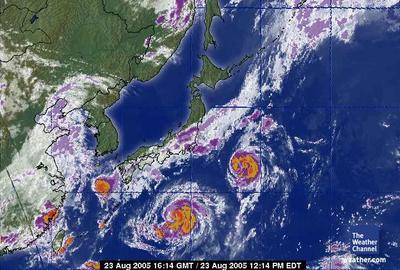 Merely mention the word, and my spine tingles. After surviving the fury of super-typhoon Pongsona in Guam in 2002, I am well aware of the catastrophic potential of such storms. As the news article states, a bumper crop of 10 typhoons slammed Japan last year, which is about seven or eight more than average.
Merely mention the word, and my spine tingles. After surviving the fury of super-typhoon Pongsona in Guam in 2002, I am well aware of the catastrophic potential of such storms. As the news article states, a bumper crop of 10 typhoons slammed Japan last year, which is about seven or eight more than average.
Thus, I heeded warnings about Mawar, which means “rose” in Malaysian. I braved buckets of morning rain to stock up on essentials, namely sushi and Häagen-Dazs. A female voice cried out from the afternoon raindrops; crackling echoed over the emergency PA system. She spoke slowly and calmly, but all I understood was “please,” “this is,” “typhoon,” and “Koto-ku” – the ward I call home. More informative was her stern undertone of caution. Now, did she mention anything about filling up the bathtub in case of a power outage?
Instead of remaining housebound, I strapped on Tevas and rolled up my wind pants to attend my first freelance writers’ meeting for Japanzine, which is publishing a variation of my earthquake blog for its September issue. By speaking in nouns to a platform attendant, I confirmed the following: Konban. Taifu. Chikatetsu. Mondai nai? Nan-ji ni shimari masu ka? (Tonight. Typhoon. Subway. No problem? What time do you close?)
In Tokyo, typhoon Mawar proved to be just a two-day rainstorm. Japan’s elegant umbrella etiquette enables me to enjoy such rainy days. Drizzle or downpour, kasa smoothly pop open to ward off wetness. Plastic sheaths greet customers at shop entrances. Umbrella culture also condones swapping, which initially I mistook for stealing. Tonight someone at our Canadian pub meeting place swiped my umbrella. Of all nights, just my luck, I moaned while peering through streaked glass. Worry not, a fellow writer advised, as I reluctantly helped myself to a replacement from those remaining.
On the way home, I splashed through the empty streets with my newfound guardian, which like its predecessor is clear plastic with a white J-shaped handle. They don’t come any cheaper. Streetlights illuminated driving sheets of rain. The wind was picking up. I danced across a bridge over a swollen canal, reminiscent of a Hiroshige print, Shower at Ohashi Bridge. Tokyo in the typhoon was mine for the taking.
Posted by
ジェフリー
at
2:30 PM
0
comments
![]()
Labels: Tokyo
Monday, August 22, 2005
Next Stop…Kachidoki
 5.69 million passengers on an average day. 168 stations. 114 miles of tracks. 9 lines. And that’s just the Tokyo Metro system. Four private Toei subway lines and about 30 above ground Japan Rail (JR) East lines also crisscross greater Tokyo. There isn’t enough room on one map to depict them all.
5.69 million passengers on an average day. 168 stations. 114 miles of tracks. 9 lines. And that’s just the Tokyo Metro system. Four private Toei subway lines and about 30 above ground Japan Rail (JR) East lines also crisscross greater Tokyo. There isn’t enough room on one map to depict them all.
When I’m asked about my favorite Japanese words, I rattle off subway stops to surprised reactions. “I never thought about the names before. They are just station names,” one local girl told me. Well, so is 51st Street, or Brooklyn's Avenue X. Unlike their New York City counterparts, however, Japanese names naturally roll off the tongue, begging to be repeated for sheer linguistic enjoyment, which I do to puzzled looks from fellow commuters.
I’m partial to stations starting with “K,” “O,” or on the Chiyoda Line. Here are my Top 10. Can you find and pronounce them all on the map above? Click on it to enlarge. 10.Kayabacho 9.Sumiyoshi 8. Ochanomizu 7.Kasumigaseki 6. Higashi-nihombashi 5.Okachimachi 4.Kita-senju 3.Nogizaka 2.Kiyosumi-shirakawa 1.Kachidoki
10.Kayabacho 9.Sumiyoshi 8. Ochanomizu 7.Kasumigaseki 6. Higashi-nihombashi 5.Okachimachi 4.Kita-senju 3.Nogizaka 2.Kiyosumi-shirakawa 1.Kachidoki
Posted by
ジェフリー
at
8:20 AM
1 comments
![]()
Labels: Tokyo, transportation
Monday, August 15, 2005
Dancing Silhouettes
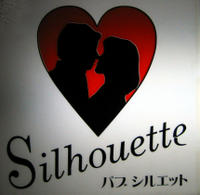 …Continued from previous entry.
…Continued from previous entry.
“Where are we going?” I wondered aloud. I use this alley to access the side entrance of the supermarket. Nothing special ever stood out among these now darkened restaurants. “Third floor. I’ll show you,” Jerry said with a wink. The sign read: Silhouette. My mind translated: hostess bar.
Fingertips tingled as elevator doors opened. Jerry guided me into uncharted territory. A Filipino woman in a kimono spun around. I gawked back at her. What non-Japanese woman dresses in a kimono? Apparently one who makes a lot more money than I do wearing a suit and tie in a classroom.
¥4000/hour ($38) buys a  table with a hostess pouring unlimited watered-down Suntory whisky. Karaoke and flattering conversation are also included. That Jerry was still in a generous mood made this an even merrier occasion. On a teacher’s salary I could afford about 15 minutes of this “debauchery.”
table with a hostess pouring unlimited watered-down Suntory whisky. Karaoke and flattering conversation are also included. That Jerry was still in a generous mood made this an even merrier occasion. On a teacher’s salary I could afford about 15 minutes of this “debauchery.”
Heads turned towards the odd couple. Two white men – one middle-aged, paunchy, and with a shaved head and his young sidekick – needed pairing up. Sensing a covetous look in their stares, my self-consciousness waned at feeling out of place. Bored with the routine of chatting up drunken Japanese salarymen, these women viewed us as objects of fresh conversation, and perhaps ones who could relate to being outsiders in Japan.
Although whisky ranks just above embalming fluid on my preferred drink list, it was the only beverage included in the set price. Fortunately, it was  watered down enough to suppress my gag reflex. Monica (her stage name – she has a day job reputation to maintain) plunked ice cubes with grace. “Do you want something to drink, too?” I offered. That wasn’t included either, but Monica didn’t seem disappointed. On her next rotation in 20 minutes a new client would buy her a drink she didn’t want.
watered down enough to suppress my gag reflex. Monica (her stage name – she has a day job reputation to maintain) plunked ice cubes with grace. “Do you want something to drink, too?” I offered. That wasn’t included either, but Monica didn’t seem disappointed. On her next rotation in 20 minutes a new client would buy her a drink she didn’t want.
These Filipinos spoke better English than every Japanese person I’ve met, and were far more complimentary. “Your high nose is perfect!” Monica lied. They are paid to dispense alcohol and advice, and listen to you ramble about your wealth, power, lackluster sex life, problems at work, or headaches at home, where your family soundly sleeps while you flirt late into the night.
These professional are also paid to sing karaoke. In practice, however, Sindy, 19, stood silently beside me. Unbelievably, for three months in Japan, I had yet to try karaoke. In fact, I had never sung aloud before, except privately in the shower or in gridlock on the Merritt Parkway. In my first live performance, I belted out all the wrong songs, which were either beyond my octave range (Stacie Orrico’s “There’s Gotta Be More To Life") or didn’t really have lyrics (Daft Punk’s “One More Time”).
I learned my lesson. On a follow-up visit two weeks later with a treating Japanese businessman I met at Daruma restaurant, I entertained with a tone-deaf performance of Bon Jovi’s “Livin’ On A Prayer.” A wave of patriotism swelled up inside as let everyone know that, like Bruce Springsteen, I, too, was “Born In The USA.” A little more practice, and I’m sending a demo tape to American Idol.
Salarymen sat in dark corners in darker suits numbing their minds with whisky. An American half their age sang on stage in track pants, t-shirt, 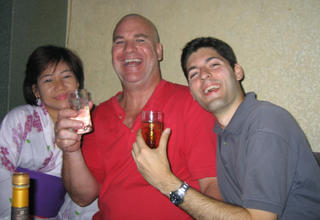 and Tevas. The owner, with hands in his hair, calculated what effect I would have on future business. Was I an amusing novelty or irritation to his clientele? Or would nobody remember a damn thing the next morning anyway?
and Tevas. The owner, with hands in his hair, calculated what effect I would have on future business. Was I an amusing novelty or irritation to his clientele? Or would nobody remember a damn thing the next morning anyway?
I was beginning to forget myself. Monica slipped me a ¥1000 bill and whispered something in my ear, which promptly went out the other. How was I getting tips in a hostess bar? The next thing I knew I was dancing with other men’s paid companions. And then with the men themselves. A girl half my size kept coming over for scandalous hip shaking. She was Japanese, which made her someone’s girlfriend, not a hostess. Was I going to get jumped in the alley on the way home?
Freestyle dance ended and Céline Dion began. “That’s our song!” I grabbed Sindy and rushed to the television screen’s scrolling lyrics. I ripped the microphone cord from its taped position and riled up the audience who had stuck around for the 3 a.m. closing. I poured my heart into the song until I couldn’t go on anymore. During the last verse, I dropped to my knees, flailed my arms, and dragged out the final refrain. Céline herself would have been proud.
Like Daruma earlier that night, Jerry and I closed down Silhouette. Outside in the alley, I happened upon my midget dancing partner. She was sitting with her not-so-miniature yakuza boyfriend. Would dance floor antics come back to haunt me? I casually joined them on the curb in the shadows of the supermarket.
They didn’t speak English, but after enough Japanese whisky I was fluent in their tongue. I think they said they were going to drink more at another bar, but at 3 a.m. on Tuesday they must have been headed home. “Ja mata,” I chirped as we parted in opposite directions along deserted Kiyosumi-dori.
I woke up with a bruised tailbone. My mouth tasted like Suntory. “My Heart Will Go On” looped around in my head. Since when did I drink whisky and like Céline Dion? Never again I told myself, crawling into my sandals to make an emergency run to McDonald’s. With comfort food reviving distressed organs, I e-mailed Jerry thanking him for a good time.
Glad you enjoyed yourself. It is fun to be a guy in this country and in Asia in general.
Stay well,
Jerry
Posted by
ジェフリー
at
11:15 AM
2
comments
![]()
Labels: social
Wednesday, August 10, 2005
Dinner with the Fam (Part II)
Whenever I’m feeling a little sabishii in this impersonal city, I seek out my parents for camaraderie and home cooking. My Otosan and Okasan, that is. They own Daruma restaurant. Daruma is a rare inviting place in a land where I constantly play the intruder. Jerry, another gaijin patron, said it best: “This is one of the few places that foreigners aren’t just tolerated, but are welcomed.”

Hicca, another familiar face, has also vanished. Her increasing duties at the radio station have forced her to abandon her part-time post behind the counter. Naaoki (“Now”), her 38 year-old replacement, refills customers’ glasses while sipping his own draft beer. His signature style includes overalls and a Slice trucker cap to keep his dyed golden brown hair from covering his eyes. Now’s casual style fits well with Daruma’s no frills service. I spotted Now ashing into the sink soaking plates. Later he filled sho chu glasses with chunks of ice that had splintered onto the floor.
With Hicca gone, Jerry restored my bilingual lifeline. This native New Yorker is as much of a regular as anyone else on a stool. He feels so at home that he lobs scallion stalks into the garbage behind the counter. “It’s the one good thing I do for my body,” he said of his nightly plate of vegetables. A kindergarten teacher by day, Jerry is a chef at a sports bar he co-owns in Shinjuku 3-chome. He’s the size of an industrial refrigerator at his restaurant, or 10 times that of one of his students. His recently shaved head adds to his unmistakable presence.
The stools flanking me are both occupied, but a man relocates himself so that the two English speakers can chat. Jerry’s arrival enabled me to catch up on family affairs; the language barrier had really kept me out of the loop.
Otosan was in the hospital. Liver cancer. My stomach churned at the news. He’s been battling the disease for some time and undergoes periodic checks, but is slowly losing the pitched battle. “The Old Man,” as Jerry calls Otosan, gave up smoking years ago, but occasionally hits the bottle. I recalled his flush nose and cheeks on prior visits. Although beyond 70, his heart remains full of generosity even though his mind sometimes misses a beat.
Such as the time when I ordered ika malu (grilled squid rings). Otosan removed the white creature from the freezer, only to put it back and select a larger one. Instead of unwrapping the plastic and popping my meal into the oven, he placed it on a stack of empty crates next to the oven. 10 minutes later, with a small gesture, I politely reminded him to turn up the heat on the box.
Daruma’s aura wasn’t the same without him. Miles Davis was silent. Absent were toothless grins, friendly pats on the back, and announcements that I was an English teacher…and looked like Tom Cruise. “The first thing I notice when he’s gone is that the prices go up,” Jerry dryly stated. “The Old Man’s been discounting my meals for 15 years. Probably yours, too.”
That leaves Okasan in charge. “Ma” on occasion has welcomed me with a free sampling of edamame, sashimi, or carrots in fluffy paste. “She’s got a real mean streak in her,” Jerry warned, signaling for another beer. Ma hangs on to her husband’s bygone habits and also mooches off customers. She catches her breath from cooking to inhale a cigarette with a businessman before moving down the line to help herself to a swig of a customer’s beer. She freely fingers a cuttlefish tentacle from my neighbor’s plate. Nobody complains. We’re all family at Daruma, even the white overseas relatives.
More shocking news: the family tree has to be redrawn. Otosan and Okasan have two daughters, but Hicca was not one of them. Jerry’s revelation saved me the embarrassment of expressing concern over Hicca’s ailing father, who I should have realized is far too old to be her father in the first place.
Daughters include Masa, who is on her second husband, and Aya, who works only Fridays.  Masa’s makeup is a pleasant feminine touch amid a grimy interior. Aya, however, radiates beauty. She’s a former supermodel. A picture of Arnold Schwarzenegger pecking her on the cheek hangs on the wall. According to Jerry, the parents used to “pimp out” their daughters to lure male customers. Their flirtatiousness was a proven recipe to drive up drink tabs. But those days were a few husbands ago. Aya since “has put on some pounds,” and is a married mother.
Masa’s makeup is a pleasant feminine touch amid a grimy interior. Aya, however, radiates beauty. She’s a former supermodel. A picture of Arnold Schwarzenegger pecking her on the cheek hangs on the wall. According to Jerry, the parents used to “pimp out” their daughters to lure male customers. Their flirtatiousness was a proven recipe to drive up drink tabs. But those days were a few husbands ago. Aya since “has put on some pounds,” and is a married mother.
I popped bite-size kawa ebi (river shrimp) into my mouth. It was 22:30, and customer traffic had switched to a net outflow. Jerry and I continued to talk. He mentioned how he lost his own Japanese wife a few years ago, but didn’t want to dwell on it. 22 oz. bottles of Sapporo piled up between us, which Jerry corralled to his side to indicate they went on his tab. He was in a generous mood after settling a lawsuit with a cab company. Three years ago, while waiting on a corner, a cab maneuvering close to the curb to pick up a passenger crushed his ankle. The settlement wasn’t as much as he had hoped for, but he risked not getting one Yen if litigating.
We bid farewell to the family as the plastic wall clock struck 23. Ma was on her last cigarette, and ready for a good night’s sleep. “You interested in some debauchery?” Jerry asked, mounting his bicycle. The night was young. “Go down to the end of this block, turn right, and then make your first right. Wait for me there.” “You mean just right over there?” I said pointing to the supermarket straight ahead. “Don’t point! Just meet me there,” he scolded. The darkness of evening was just a Silhouette…[to be continued].
Posted by
ジェフリー
at
1:20 PM
0
comments
![]()
Labels: food
Tuesday, August 02, 2005
Temple Hopping
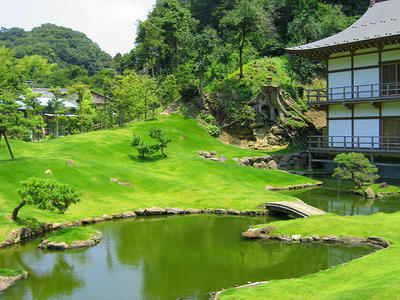 An hour beyond Tokyo’s choking concrete lies Kamakura, an ancient city and former capital. Sprinkled with 65 temples and 19 shrines, Kamakura’s shady side streets lead to cultural treasures…and the beach. I followed a circuit of the best known Zen temples, and paid homage to Diabutsu the Great Buddha, the third largest in the world. For 20 cents I climbed inside his hollow back, which felt like climbing into an oven. Cast of bronze in 1252, Buddha shrugged off a tidal wave in 1495 that swept away the wooden temple housing him. His meditation has remained uninterrupted despite being inundated with tourists. Sacrilege or early supper, down the street I slurped Buddha udon soup with ingredients cleverly arranged as Buddha’s face: egg yolk eyes, scallion hair, fish cake nose, and pink ginger mouth. Tasty and enlightening!
An hour beyond Tokyo’s choking concrete lies Kamakura, an ancient city and former capital. Sprinkled with 65 temples and 19 shrines, Kamakura’s shady side streets lead to cultural treasures…and the beach. I followed a circuit of the best known Zen temples, and paid homage to Diabutsu the Great Buddha, the third largest in the world. For 20 cents I climbed inside his hollow back, which felt like climbing into an oven. Cast of bronze in 1252, Buddha shrugged off a tidal wave in 1495 that swept away the wooden temple housing him. His meditation has remained uninterrupted despite being inundated with tourists. Sacrilege or early supper, down the street I slurped Buddha udon soup with ingredients cleverly arranged as Buddha’s face: egg yolk eyes, scallion hair, fish cake nose, and pink ginger mouth. Tasty and enlightening!
In between manicured gardens and tranquil temples, I battled the summer heat with two helpings of purple sweet potato ice cream.  It tasted better than you’d expect; however, I found something better than any flavor ice cream. Kakigori (shaved ice) is a refreshing Japanese sweet. A friendly retired Japanese couple treated me after a steep climb in the woods above Kencho-ji Temple. I had my kakigori flavored with green tea syrup, garnished with azuki (sweet red beans), and capped with a scoop of creamy vanilla ice cream. As the syrupy ice began to melt, I blended in the cream and red beans for heavenly refreshment. Although variations are available nationwide, this shop’s kakigori is worth a return trip to Kamakura.
It tasted better than you’d expect; however, I found something better than any flavor ice cream. Kakigori (shaved ice) is a refreshing Japanese sweet. A friendly retired Japanese couple treated me after a steep climb in the woods above Kencho-ji Temple. I had my kakigori flavored with green tea syrup, garnished with azuki (sweet red beans), and capped with a scoop of creamy vanilla ice cream. As the syrupy ice began to melt, I blended in the cream and red beans for heavenly refreshment. Although variations are available nationwide, this shop’s kakigori is worth a return trip to Kamakura.
After large helpings of culture and cuisine, I relaxed beachside at a café with a frosty beverage. Boarders rode waves while windsurfers zipped across Sagami Bay. Children flung wet sand at each other; older kids buried one of their own on the beach. Sunshine faded to dusk. I soaked up a seaside atmosphere that felt more like California than Japan, and frowned at the thought of returning to the current capital city.
See surf n’ shrine images from what I consider to be my finest day in Japan to date.
Posted by
ジェフリー
at
1:00 PM
2
comments
![]()
Labels: domestic travel
Thursday, July 28, 2005
Keitai Dreams
The sun was shining. The humidity was low. It was a lovely day to pursue my keitai dreams.
Lacking a proper visa, my skies were filled with gray. Cell phone contracts are not approved for those holding temporary visitor status. Gray skies had lasted three months. Being without a keitai in Tokyo is like being without a car in Los Angeles. You feel helplessly cut off from the city passing you by. Pay phones and buses are for the birds.
Sleek Japanese keitai are years ahead of their  American counterparts. The latest buzz is touch screens. Features like 2-megapixel video cameras with zoom, 180˚ rotating LCD screens, infrared data transmission, video call, action games, and mp3 compatibility don’t raise eyebrows. But mine did as co-workers showed off their ¥1 phones for last year’s models with technology still unavailable in the States. Phones here do everything, including the dishes…that is, if your washer is Bluetooth enabled.
American counterparts. The latest buzz is touch screens. Features like 2-megapixel video cameras with zoom, 180˚ rotating LCD screens, infrared data transmission, video call, action games, and mp3 compatibility don’t raise eyebrows. But mine did as co-workers showed off their ¥1 phones for last year’s models with technology still unavailable in the States. Phones here do everything, including the dishes…that is, if your washer is Bluetooth enabled.
During my visaless existence, a friend of a friend had lent me his old prepaid keitai. With incoming calls free, I simply bought talk time to initiate dialing – at 57 cents/minute. Calling NY was cheaper than ringing next door. The kicker was that this model was so outdated and cheap that – forget lack of camera – the operating system was only in Japanese. Beyond dialing and picking up, the functions were Greek to me.
I affixed an instructional Post-it note to the  back in the event of an emergency text message. Press the paper airplane-looking key. Select option #3. In the flashing red box, hit enter. Select #2. Scroll down to the fifth field…. It became easier not to keep in touch with anyone.
back in the event of an emergency text message. Press the paper airplane-looking key. Select option #3. In the flashing red box, hit enter. Select #2. Scroll down to the fifth field…. It became easier not to keep in touch with anyone.
However, a visa would be a passport to freely communicate using the coolest keitai, the keitai of my dreams. With the visa glue still drying, I popped into a store. I quickly realized that, despite my intention to comparative shop, I had no skills to bargain hunt.
I approached the sidewalk salesman announcing summer deals. ”Sumimasen, eigo ga hanase masu ka?” He put down his mic in mid-sentence, and handed me a bilingual phone. “No, no, no…does anyone here speak English?” Sweat dripped down his furrowed brow. The sales ladies inside were poking by the window like visitors catching a glimpse of a rare zoo animal. “Oh, no! He’s coming inside – run for your lives!” was the next thing that crossed their minds, as they went to pull straws in the back.
After failed attempts in Japanese to inquire about contracts, I found out the only English speaking au brand vendor was on the U.S. military base near Yokohama – talk about roaming. Just one operator in Tokyo was equipped to assist English speakers – a Vodafone branch in Tokyo Rail Station. There my keitai dreams were shattered.
¥1 phones only came with two-year contracts. Cancellation penalties applied. Monthly plans for one-year contracts were too expensive for my infrequent calling habits. Euphoric keitai anticipation collapsed into sad reality. To the sales clerk I uttered, “prepaid phone.”
According to Vodafone’s website, prepaid phones are ideal for people who receive more calls than they make (read: who don’t have a life – like the picture of grandpa using such a model). Since I have no friends to dial in Japan, incoming wrong number calls are free. But after three months of inconveniencing myself with an unworkable phone, I was merely swapping models. While relieved at the ability to finally set up a phone book (okay, I know three people), I kicked myself for ignorance. Since prepaid phones are not contractual, I could have purchased a bilingual model months ago without a visa.
Of Vodafone’s four prepaid models, 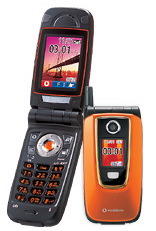 I, of course, eyed the cheapest. It was the same non-flip phone style as what I had. No bells or whistles. It was like asking for a IIc at the Apple store in Ginza. I refused to pocket a relic in the most technologically advanced nation. I splurged $65 for a model with a .3-megapixel zoom camera, which actually was a step up from my phone in the States. V301D only came in spark orange. So be it, at least I’ll proudly answer calls on Halloween. I couldn’t help but feel what my apartment neighbor blurted out: “You got ripped off!”
I, of course, eyed the cheapest. It was the same non-flip phone style as what I had. No bells or whistles. It was like asking for a IIc at the Apple store in Ginza. I refused to pocket a relic in the most technologically advanced nation. I splurged $65 for a model with a .3-megapixel zoom camera, which actually was a step up from my phone in the States. V301D only came in spark orange. So be it, at least I’ll proudly answer calls on Halloween. I couldn’t help but feel what my apartment neighbor blurted out: “You got ripped off!”
V301D does have a few redeemable features. Strobe light for incoming calls, sub display, and animecha. Animecha feature selectable animations that become the personality of your phone upon opening it or configuring settings. Puta the golden bear is a “cry-baby.” Hanako the bunny totes a snail on a leash. Mr. Zhen the panda “enjoys shaking his groove thing on the dance floor.” Mr. Tanimura the salaryman “faithfully does his bit at the office day-in and day-out.” Judy the white student is “as tough as one of the boys,” but “still enjoys being a girly girl.” And don’t wake Tanu-tan creature from naps, or he lashes out with bulging muscles.
All creative, but I selected Bi-nasu, 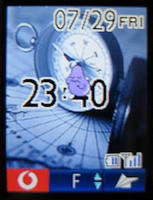 the bowing eggplant. Although nasu is one of the few foods I happen not to enjoy, Bi-nasu won me over with his lovable animations – blowing kisses, sunbathing, guzzling beer, belching, and eating his hair (the green calyx cap) [see photo, right], which also blows off in high winds.
the bowing eggplant. Although nasu is one of the few foods I happen not to enjoy, Bi-nasu won me over with his lovable animations – blowing kisses, sunbathing, guzzling beer, belching, and eating his hair (the green calyx cap) [see photo, right], which also blows off in high winds.
His bio scrolls as follows: “Generally speaking I’m impatient, but I do slow down from time to time to enjoy life in the slow lane. Whenever I have some extra change in my pocket, I like to throw back a few beers with my pals.”
Now that’s an eggplant I can relate to. Having saved more than a few ¥500 ($4.75) coins on my crappy keitai, Bi-nasu, I’m buying.
Posted by
ジェフリー
at
4:50 PM
1 comments
![]()
Labels: Tokyo
Monday, July 25, 2005
6.0 at 16:35

 It was any lazy Saturday afternoon. Noshing on pork tonkatsu in my room, I waited for my laundry in the dryer downstairs. I was thinking about the long night ahead of me at a party I would attend in Ebisu. And then my soy sauce shook. Make that the whole building, first slowly then harder. My door was propped open, and outside I saw power lines bouncing. Jishin da (Oh, an earthquake), I muttered to myself. At least sleep wasn’t interrupted this time.
It was any lazy Saturday afternoon. Noshing on pork tonkatsu in my room, I waited for my laundry in the dryer downstairs. I was thinking about the long night ahead of me at a party I would attend in Ebisu. And then my soy sauce shook. Make that the whole building, first slowly then harder. My door was propped open, and outside I saw power lines bouncing. Jishin da (Oh, an earthquake), I muttered to myself. At least sleep wasn’t interrupted this time.
Realizing that the rumbling was only increasing, I dropped my Hello Kitty chopsticks and crouched in the entryway. It sounded like Godzilla was waking up the neighborhood. Across the alley an elderly man, jarred from an afternoon nap, stood by the window in his underclothes. Dissonant metallic groans resonated through these sleepy side streets. Buildings, bridges, and car parks were movin’ to Mother Nature’s beat. Self-reassurance that it’s going to end any moment now began to shift to how much worse was it gonna get? Before I could ponder – could it be, the long overdue “big one” – the temblors died.
Neighbors poked their heads out of doors and windows. I felt like screaming “WHOO HOO!” at the top of my lungs, as an exclamatory release to the adrenaline rush of surviving an uncontrollable act. While fortunately not the big one, this 6.0 quake was the strongest to shake up the capital in 13 years.
Tokyo is the most disaster-prone city in the world because tens of millions of people populate a dense metropolis built on an active seismic fault. Munich Re indexes San Francisco’s insured risk at 167. Tokyo’s is 710. I’m not sure what units they’re talking about, but the difference is evident.
What this means for Tokyo Tanenhaus is that while I have an emergency fanny pack handy, I’m going to insure myself with extra water, rice crackers, and cups of Häagen-Dazs. It seems that rest of Tokyo needs to wake up and stock up in the wake of Saturday’s foretaste of expected disaster.
Posted by
ジェフリー
at
9:00 AM
1 comments
![]()
Labels: Tokyo
Friday, July 22, 2005
Visa, Everywhere I Want to Be
Junk flyers clutter my mailbox. Pictures are the only clue to services advertised in Kanji lettering. This week’s offers included 80% off horses, chinchilla adoption, a dollhouse moving company, and apartments for cartoon characters. Nearly lost in the shuffle was more personal correspondence: a postcard from immigration notifying me that my visa was ready. Hallelujah!  The trip to Shinagawa immigration center in southern Tokyo required a subway to bus transfer. This bus route, however, is not exclusively for foreigners awaiting face time with bureaucrats. Local riders must dread sharing their commute with Filipinos, Australians, Chinese, Americans, and other filthy animals seeking residence permission among this xenophobic society. Curiously, a stop exists in the middle of a bridge, perhaps as a convenience for lonely leapers in a nation ranked among the top in suicide rates per capita.
The trip to Shinagawa immigration center in southern Tokyo required a subway to bus transfer. This bus route, however, is not exclusively for foreigners awaiting face time with bureaucrats. Local riders must dread sharing their commute with Filipinos, Australians, Chinese, Americans, and other filthy animals seeking residence permission among this xenophobic society. Curiously, a stop exists in the middle of a bridge, perhaps as a convenience for lonely leapers in a nation ranked among the top in suicide rates per capita.
Even Japanese obsession with order and efficiency could not streamline bureaucratic inertia. I languished in line with people from around the world to trade my postcard for a number, which then would be exchanged for the crowning glory, a work permit stamp in my passport.
I clutched 82; they were now serving 33. I began the countdown to becoming fully legal. No more crossing the street when I spotted police activity. The next number jumped to 43. Then it dropped to 27 before soaring to 75, just 7 away from the magic number. This lottery rollercoaster toyed with my emotions, especially when the blinking counter hit triple digits. Faces familiar from waiting in line had all been served. I groaned when 183 rolled around. Since leaving the country without a separate re-entry stamp invalidates my visa, I also took a number at the nearby re-entry application desk. I might as well wait in two lines at once.
“Hachi-juu ni ban,” said a man behind the counter. I remained mesmerized on the “Now Serving #146” sign. Suddenly it clicked – he was calling 82! I rushed to the counter with my ticket, thankful to at least be conversant in Japanese numbers up to 100. An enormous mole sprouted from the bridge of the man’s nose. He told me to purchase a visa revenue stamp from downstairs and to return to wait for 82 to flash on screen. These fee stamps are sold inside the convenience store on the ground floor. “One package of squid jerky and one ¥4,000 stamp, please.” 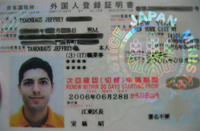
I wasn’t done with Japanese bureaucrats for the day. With work visa and re-entry stamps glued into my passport, I headed across town to my borough government office to pick up my alien identification card, which was ready after three weeks of processing. On the way inside I passed a sign for the welfare office, and considered applying for benefits. Pricey rent, exorbitant health insurance, and below minimum wage salary makes for a losing combination in the world’s most expensive city. But the feeling of having visa in hand after three months: priceless.
Posted by
ジェフリー
at
2:00 PM
0
comments
![]()
Labels: bureaucracy, Tokyo
Monday, July 18, 2005
Togi & Bao
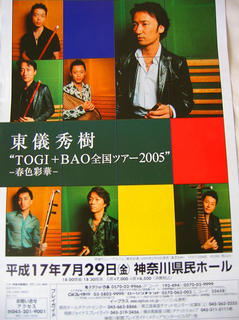
Chinese tourists I had met offered me their extra ticket to hear traditional Japanese and Chinese instruments. But for 2.5 hours? I flashed back to the painful Niijuku assembly. Ultimately, the free ticket and opportunity to hear an ancient musical art form convinced me to venture beyond Tokyo proper.
Hideki Togi is somewhat of a cult figure in these parts. About 70% of the audience was middle age to mature women. I was one of two males under 30, and the only Caucasian period. Togi moved the audience with lyrical vibrations from a hichiriki (photo, left).  He is a master of gagaku, ancient Japanese Imperial Court music introduced from China and Korea around 1150 A.D. Bao, the six-piece Chinese new-trad ensemble, also shared the stage with large red pillars evoking a Chinese setting, but in Kanagawa Prefecture. Other odd instruments included the stringed biwa (photo, lower left)
He is a master of gagaku, ancient Japanese Imperial Court music introduced from China and Korea around 1150 A.D. Bao, the six-piece Chinese new-trad ensemble, also shared the stage with large red pillars evoking a Chinese setting, but in Kanagawa Prefecture. Other odd instruments included the stringed biwa (photo, lower left)  and wooden flute-like ryuteki.
and wooden flute-like ryuteki.
Jazzy melodies lilted through the concert hall against a backtrack of synthetic beats and grooves. Modernity-infused classical court compositions. Kenny G meets the Silk Road. However you classify it, the up-tempo numbers were rather catchy.
Intermission ushered in transformation. The Shanghai Six, as I labeled “Bao,” swapped their tuxedos for Polo’s summer pastel shirt collection. Togi swaggered onto stage in bedazzled rubber pants and black cowboy boots. His white shirt sparkled from underneath a Harley Davidson jacket. Stage lights flashed. Golden hair spray shimmered. The illuminated background screen mutated ever-brighter colors. Front row fans rose from their seats and clapped along. Some waved homemade signs with shiny ribbons. Seven jesters on stage turned court traditions upside crown.
Togi commanded Papal inspiration. And like the Pope, only a select few were granted a private audience. A woman in her late 30s queued with us pass-holders. “Is this the handshaking line?” She herself was shaking at the prospect of a face-to-face encounter. Eyes wide, she twitched as if under the influence of a higher spirit.  Although denied access, she took Togi away with her in the form of a concert CD.
Although denied access, she took Togi away with her in the form of a concert CD.
Backstage, the Chinese tourists introduced me to their friends, two of the Shanghai Six (far right). Togi came over for a meet and greet. Since his English was passable, I didn’t break out my broken Japanese. And nor did I sneak off with his Harley jacket hanging nearby. When nobody was looking, I ran my fingers over the embroidery. Fingers sensed what the eyes saw, and flicked on the light bulb in my brain: Yahoo! Auctions Japan to cover next month’s rent.
Posted by
ジェフリー
at
10:15 AM
0
comments
![]()
Labels: social
Wednesday, July 13, 2005
Turn Back the Clock
 Erina, Debby, Jeffrey, and Makiko all grown up
Erina, Debby, Jeffrey, and Makiko all grown up
Remember those mysterious Japanese girls at your junior high school? You didn’t get to know them. They ate those rice ball lunches and weird Japanese sweets in the corner of the cafeteria, and played volleyball after school. Maybe they only attended your school for a few years, moving away before high school, never to be heard from again. Well, at least until last Sunday.
After 11 years, I reunited with Makiko and Erina – on their Tokyo turf. Debby, my half-Japanese hometown friend, facilitated the bittersweet reunion during her visit here. Actually, I couldn't even recall their names, and swore that we had never met on account of taking classes in separate “houses” of our junior high. Makiko, however, produced a band class photo from 1992 in which she played second flute, just chairs away from this writer, then the fourth oboist. Erina tooted on the clarinet in the row behind us.
More than a decade and 7,000 miles later, four junior high graduates from 1994 shared vanilla ice cream on a sweltering afternoon. The sweet simplicity of the plain flavor complemented our innocent visages in the yearbook that Makiko dusted off. We laughed at outdated hairstyles, incompetent social studies teachers, and now deceased librarians. Coincidentally, we were the same age back then as the kids I teach now.
Let’s rewind life to 1994 to see how we appeared in our 8th grade portraits:

I think you’ll agree what a difference 11 years makes.
Posted by
ジェフリー
at
8:55 AM
3
comments
![]()
Labels: social
Friday, July 08, 2005
Khaos at Kanokita
The morning assembly ended, and lessons began. Would students live up to their infamy? (See previous post). On the third floor landing, I caught my first glimpse into a classroom through its sliding plastic doors. An airborne English textbook crash-landed on the back of a student’s head. This wasn’t going to be easy. Send in the heavy artillery. Send in the 6’2” American English teacher.
Self-introduction was planned for each class. On the blackboard I scrawled my name, birthday, nationality, and caricatures of my family. Students then asked 24 questions scripted on a printout. Based on my answers, they must have wondered if a bona fide American was in their presence. “Do you like watching tv?” No. “Do you drink coffee?” No. “Do you call to your family?” No. “Do you have any pets?” No. “Not even in America?” No.
And given rumors of their reckless behavior, I wondered if these were truly Japanese students, or just American teens in disguise. Hints of ingrained disobedience included untucked school uniforms, crumpled collars, rolled up sleeves, low-hanging slacks, desktop graffiti, misaligned desk rows, and not bowing to teachers.
A madhouse describes what I walked into for my first 8th grade class. A boy sporting typical Japanese-style bed-head and a pointy chin dotted with a distinguishing birthmark unleashed havoc with pink and red highlighters. First, he desecrated another student’s desk before jabbing the boy’s white uniform. Hoping to avoid my Brooks Brothers suit from becoming a casualty, I tensed up behind the teacher’s desk out of range, wondering how to transition to “My name is Jeffrey….” The other student returned fire, and both ended upon rolling on the floor. “Son of a bitch!” the bully cried as his victim exacted revenge. Ms. Hattori passively looked on: “The students are very badly disciplined. Don’t mind that.”
The melee ended, but the bully then perched himself on another boy’s desk before returning to his seat to cut up the handout with scripted questions, the snippets of which he dumped onto the classmate in front of him. Forty minutes later, the floor looked as if it had flurried in Tokyo in July. Meanwhile, in the rear, a group of girls pushed their desks together to while away the time writing letters in a rainbow of colors, reducing my introduction to background noise.
Seventh graders greeted me with more students on the floor. Half a dozen boys were sprawled on top of one another as if practicing a rugby maneuver. The face at the bottom was turning blue; eyes bulged from their sockets. The mass of flesh untangled itself, and the boys played JanKenPo (rocks, paper, scissors) to determine the order of the next pile-on.  For lunch, I was permitted to dine with the most mannered and inquisitive age group (photo, right). Seventh graders nibbled silently while staring at my mastery of chopsticks, perhaps waiting for me to do something foreign like ingest the salty soup of the day through my ear canal.
For lunch, I was permitted to dine with the most mannered and inquisitive age group (photo, right). Seventh graders nibbled silently while staring at my mastery of chopsticks, perhaps waiting for me to do something foreign like ingest the salty soup of the day through my ear canal.
Mischief resumed in the afternoon. An intimidating ninth grader approached me in the hallway. “Me too, me too,” he said out of the blue. “Nice to meet you. Yoroshiku,” I replied, to which he responded by dropping his pants and saying something in Japanese about his tighty-whities. Another student approached with a fruit carefully drawn on a folded piece of paper. “Strawberry,” I said with an encouraging smile, waiting for him repeat the new word. Instead, the fold opened, and the strawberry became a hairy penis. Welcome back to junior high.
I cringed walking into my last class of the day. Me too pants-dropper kid was at the board, which now read “I LIKE SEX.” He took a seat next to his friend in the front row, where together they recited an explicit line from a movie or rap lyrics. I had never heard any student curse until the earful I got today.
Hoping to change the topic, I showed them my picture album. “Bust size?” one asked, pointing to a female in a cocktail dress. “Big rack!” Me too concurred. I made it through my introduction, and had students introduce their names and favorite hobby. One agitated girl refused to answer, and soon after stormed out of the classroom, only to return a few minutes later to retrieve her bag and leave for good. The ultimate insolence.
At the end of day one, I had exhausted my repertoire of Teacher’s Emergency Japanese Phrases, including yamete stop!; shinai de kudasai please don’t do that!; urasai shut up! [lit.: loud]; and nani yatten da yo? what the hell are you doing? It’s a start, but next rotation I’m going armed with stronger language to enforce order. Anyone know the translation for, “Do that one more time, and I’ll shove my foot so far up your ass, I’ll kick your teeth to Yokohama?”
Posted by
ジェフリー
at
4:30 PM
0
comments
![]()
Labels: Kanokita
Wednesday, July 06, 2005
Bad to the Bone
 History haunts Kanokita's two-tone stairwells. The sickly pale green is scuffed black while the white above has long since yellowed. Descending the stairs on our way to the Monday morning assembly, Mr. Mochizuki and I chatted candidly about the school’s past.
History haunts Kanokita's two-tone stairwells. The sickly pale green is scuffed black while the white above has long since yellowed. Descending the stairs on our way to the Monday morning assembly, Mr. Mochizuki and I chatted candidly about the school’s past.
“Maybe you have heard there are the most prolglrams at this school?” “Oh, that’s great," I said. "What kinds of programs do you have after school?” “No, no. Last year there were some accidents reported at this school. It was in the papers all over Japan.” I feigned innocence to milk juicy details.
In it’s 27 years, “Kanokita” and “success” have never appeared in the same sentence. Here, scholastic mediocrity is something to shoot for. This school consistently ranks among the worst in academic achievement in a society where middle school grades determine future salary through admission to top universities. There’s no celebration for second best, much less consolation prizes for dead last.
Although discipline and respect for authority are golden rules in Japanese society, exceptions exist. Like the crazily clad girls trolling Shibuya and Harajuku. And like the 8th and 9th grade boys at Kanokita. Mr. Mochizuki said these menaces walk out of class, eat in the hallways, and leave school property.
The school hit rock bottom in 2004 when police arrested15 students for violence. Teachers were not immune from assault, having been pelted with cans and bottles. [Apparently eating with the staff was for my own safety, lest I dine on knuckle sandwiches with students.] Miscreants wound up in a juvenile detention center. Publicity circulated island-wide. The school’s reputation sank into the gutter.
Student mutiny spooked off staff. After 2003, 12 of the school’s 24 teachers quit. Another 12 quit in the wake of 2004’s uprising, including all three English teachers, who simply stopped coming to work. The principal was given a permanent recess. With no outside applicants enticed to take the reigns of one of Tokyo’s most feared schools, the vice principal was promoted. Five years isn’t considered a long teaching tenure, but that’s the length of Kanokita's longest serving sensei. Teachers were down. Students were out – of control. The school was on the ropes.
Fast-forward: Kanokita is poised for a rebound in ’05. In 2004, shouts of “go back to where you came from” greeted new staff during their introductions. Teachers who scolded students had their collars grabbed in return. However, progress at this year’s boisterous but non-violent ceremony moved a board of ed. observer to tears.
In a gym retaining its late 70s appearance and creaking floorboards, students clamored throughout the assembly. Awards speeches were inaudible against the din without microphones. Then it was my turn. The color of my skin was ample amplification. Taking the stage, I sensed 400 pairs of eyes tracking me. Talking died down to murmurs, but that wasn’t good enough. “GOOD MORNING!” I bellowed. Heads snapped to center. Hush. “My name is Jeffrey. I am from America. I am from New York. I have been in Japan for three months. I live in Koto ward. I look forward to teaching you [sweeping gesture] English.” Mr. Mochizuki translated. The students clapped. I bowed. R-e-s-p-e-c-t.
At least for 30 seconds. Would it last the rest of the day? Find out what I was up against….to be continued….
Posted by
ジェフリー
at
11:45 AM
0
comments
![]()
Labels: Kanokita
Friday, July 01, 2005
The Losing Team
 What’s it like to be on a losing team? Just ask the
What’s it like to be on a losing team? Just ask the Boston Red Sox Chicago Cubs. Or the staff at Kanokita Junior High. There are two dozen junior high schools in one of Tokyo’s quiet southeastern wards. I rotate among four. Teachers at two schools weighed in about my upcoming debut at the third. “Maybe, they are the worst,” Mr. Nakamura at Nubata School advised, wrinkling his nose. “I sink they are the worst school in all of the ward,” another teacher concurred.
“I have heard some bad things about that school,” Ms. Kimura at Douyoto commented. “Last year they got some press from students fighting. Nobody wanted to send their kids there.” Okay, clearly Kanokita wasn’t the jewel in this ward's educational crown. So, what do losers want? A sure winner. Send in the American assistant English teacher. He could turn this sinking ship around. That’s exactly what Mr. Mochizuki did. I was surprised to hear from the head English teacher in advance of my first day; no other school had called me up requesting to schedule a lesson-planning meeting.
I begrudgingly obliged. I don’t get paid enough to make goodwill visits. I paced outside of the principal’s office. The frosted glass door opened, and half a dozen ninth graders filed out. Their narrow eyes, spiky hair, and rolled up sleeves announced middle school menace. Were these the kids from the newspaper? I couldn’t imagine engaging them with funny faces and American flag pencils I hand out to reward student effort.
“The principal will now make time available to see you,” Mr. Mochizuki said, ushering me into the office. Two youthful, smartly dressed teachers joined me on the couch. They, too, were part of Kanokita's ESL team. Although Mr. Mochizuki was about 50, it was his first year at Kanokita. In fact, it was everyone’s first year here. I pondered the fate of last year’s batch of English teachers. Did they walk off the job, escaping with all limbs intact? Or might I happen upon blood-soaked clothes in a janitorial closet, or find charred femurs on the soccer field? I had been warned.
In the safety of the principal’s office, everyone wanted to know how I taught lessons at the other schools of better repute. “Well, actually I am the assistant teacher. I follow the Japanese English teacher’s lesson plan.” “Ahh, I see. So you don’t have some lesson plan of your own?” “Well, sometimes I have ideas for games.” “Ahh, do you play games at the other schools?” “Yes,” although mostly I’m a human tape recorder, I wanted to add. The teachers panned for nuggets of wisdom while the Japanese-speaking principal made himself useful at the coffee machine. Quick! How do you say, "I don’t drink coffee" in Japanese?
When I mentioned eating school lunch in the classroom, Mr. Mochizuki blanched. Ms. Hattori and Mr. Hirogashi looked at each other as if I had suggested eating one of the children – an idea equally preposterous as volunteering to eat with these troublemakers. “School permitting,” Mr. Mochizuki cleared his throat. “You will eat lunch with teachers.”
Throughout the meeting I sensed that the new staff genuinely hoped to patch the school’s battered reputation. My presence would play a key role in sparking student interest in English. Nevertheless, this was a pitched battle. Unlike Jaime Escalante in “Stand and Deliver,” try as Mr. Mochizuki might, mischievous bad apples would spoil efforts at fruitful instruction.
Will Southeastern Tokyo mimic East Los Angeles? Find out next week, only at Tokyo Tanenhaus.
Posted by
ジェフリー
at
12:40 AM
2
comments
![]()
Tuesday, June 28, 2005
Atomic Guilt
Looming borough-wide tests helped sour last week at Nubata, previously my favorite school. Aside from a few games of hangman, classes were all listen-and-repeat drills. Now, what’s worse than playing human tape recorder for a morning? Sitting through an assembly in a steaming gymnasium for two hours that afternoon. This annual "Students' General Meeting" is a student-run forum to voice their concerns and requests. Of course, those voices commented only in Japanese, leaving me staring off into the choking humidity.
Students sat in rows according to grade and class section. Tables for various committee members flanked a central podium where student moderators called representatives to the floor mic. Each section rep waived a placard in hopes being selected next to speak.
The floor plan resembled a political caucus, but the proceedings had the solemnity of a tribunal, save for a few seconds of comic relief. One student sent the microphone crashing to the hardwood floor, and little Hideki from section 1-4 forgot his lines. An unruly special ed. student was dragged out of the gym by the seat of his pants.
Teachers lined the perimeter of the room slumped over in folding chairs, alternating between keeping an eye on students and closing their own. Japanese speeches anesthetized English-only eardrums. I drifted in and out of consciousness, fighting to stave off inevitable embarrassment. When would the foreigner conk out, everyone peeped over to look? Monitoring my condition was more interesting to some kids than reports from the cleaning and lunchtime broadcast committees. Eyelids sagged under their own weight. A few sympathizers winked, waived, or flashed peace signs. I smiled back before surrendering to sleep. The next day featured further discomfort. Mr. Nakamura caught me off guard before class: “Do you know something about the atomic bomb?” What did this have to do with English class? Like how we dropped two on you, I resisted saying. “You dropped one on Hiroshima and one on Nagasaki.” “Yeeeeeah, gomen-ne,” I apologized from the corner of my mouth.
The next day featured further discomfort. Mr. Nakamura caught me off guard before class: “Do you know something about the atomic bomb?” What did this have to do with English class? Like how we dropped two on you, I resisted saying. “You dropped one on Hiroshima and one on Nagasaki.” “Yeeeeeah, gomen-ne,” I apologized from the corner of my mouth.
The lesson plan for ninth graders included textbook characters Kumi and Mukami’s discussing World War II. Mr. Nakamura sincerely asked me to share what I had learned in school about these events. I mentioned studies of the War in the Pacific, and felt obligated to point out the “you started it” Pearl Harbor defense. Japan also overran Guam, Saipan, and even Alaskan islands Kiska and Atka. The teacher pressed me for reasons on why the bomb was dropped. “Well, some theorists say that the bombs ultimately saved lives by ending the war sooner.” I felt like Rummy’s spinning modern day U.S. blunders. “But I still don’t think that justified America's use of the atomic bomb against innocent civilians,” I added. That prompted Mr. Nakamura to flash poster-size images of Fat Man and Little Boy bombs and a scene of Hiroshima carnage. Some stared at the images while others watched the squirming American.
“Okay, onto the lesson. Please, can you now read the dialogue on page 18?” I recited Kumi and Mukami’s lines ad nauseam. Students repeated until perfection.
"Terrible" was a new vocab word, but I wanted to introduce a stronger one. Civilized minds can only hope history won’t repeat itself, but a recent report estimated up to a 70% chance of an attack with a weapon of mass destruction within the next 10 years.
Posted by
ジェフリー
at
6:45 AM
0
comments
![]()
Labels: Nubata, teaching (general)
Sunday, June 26, 2005
The English You Didn't Learn in School
My usual four hours of sleep interrupted by a 5.6 earthquake, I wobbled into work pooped, and plopped down at my assigned desk in the teacher’s office. Constipation. Feces. Two words scrawled on a piece of paper had the same effect as a can of iced coffee from the vending machine.
Ms. Kimura approached me. “Today’s lesson we are going to learn about sickness. I wanted to know some other words for these.” Synonyms for shit. 8:35 a.m. Wasn’t it a little early to have our minds in the toilet?
Well, if you must know, stool and bowel movement are also polite ways of saying feces. I noted the primary furniture meaning of stool, and how bowels have significance beyond the intestines. Kids say poopy. Animals excrete turds. Humans take a crap; they take a number two. I decoded the difference between numbers one and two. Ms. Kimura was eating this up. Grinning gave way to snickering. I couldn’t contain myself any longer. ESL had hit a new low. What about the “s” word, I wondered? The final fecal frontier. I shouldn’t, should I? “Shit.” I did.
Later in class we repeated G-rated afflictions like stomachache, broken leg, and insect bite. Role-playing involved asking and answering, “What’s the matter?” But student curiosity transcended textbook ailments. I acted out scatterbrained to peels of laughter.
“A student wants to know how you say…when you are sick…and you blahhh.” “Vomit?” “Yes, can you write some words for this on the board?” Synonyms for throw up. Upchuck, hurl, spill my guts. Lose my lunch got giggles after translation. “Wow, you have so many words. In Japan, we have only two.” “Oh, I can keep going, shall I?” I delved into euphemisms like pray to the porcelain god and regional Dartmouth slang like boot. I taught Japanese middle school students how to boot. What’s next, substitute beer pong for gym class table tennis? I’ll go rack the Asahi. “Class, do you know what is ‘rack’…?”
Posted by
ジェフリー
at
10:45 PM
1 comments
![]()
Labels: Douyoto

